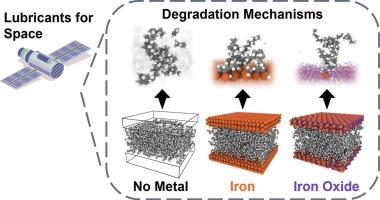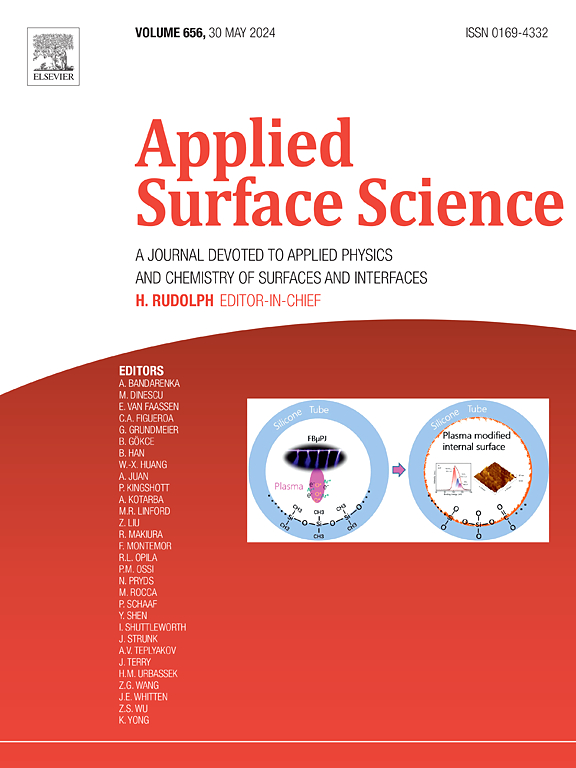金属基质对多烷基环戊烷空间润滑剂降解机理的影响
IF 6.9
2区 材料科学
Q2 CHEMISTRY, PHYSICAL
引用次数: 0
摘要
在空间应用中,机械系统的使用寿命取决于润滑剂的稳定性和耐久性。在适用于极端空间条件的润滑油中,多烷基环戊烷(MAC)油被广泛应用。然而,影响MAC润滑剂寿命的因素尚未完全了解。据推测,其中一个因素是由于天然氧化层磨损而暴露的新生金属表面催化了润滑剂的降解。这项工作利用反应分子动力学(MD)模拟研究了MAC润滑剂1,3,4-三-(2-辛基十二烷基)环戊烷的热降解。模拟比较了新生铁或氧化铁板之间的MAC油,代表机械组件的表面,或没有金属表面作为参考。在模拟中跟踪了高温下MAC降解形成的化学物质,其中最丰富的化学物质与先前报道的实验结果一致。反应性MD模拟还揭示了降解的反应途径,有助于更深入地了解用于航天机械系统润滑的MAC油的降解机制。本文章由计算机程序翻译,如有差异,请以英文原文为准。


Effect of a metal substrate on the degradation mechanisms of multiply-alkylated cyclopentane space lubricants
The operational lifetime of mechanical systems in space applications depends upon the stability and durability of their lubricants. Among the lubricants suitable for extreme space conditions, multiply-alkylated cyclopentane (MAC) oils are widely employed. However, the factors that affect MAC lubricant lifetime are not fully understood. One factor is speculated to be lubricant degradation catalyzed by the nascent metal surfaces that are exposed by wear of native oxide layers. This work utilizes reactive molecular dynamics (MD) simulations to investigate thermal degradation of the MAC lubricant 1,3,4-tri-(2-octyldodecyl) cyclopentane. The simulations compare a MAC oil between nascent iron or iron-oxide slabs, representing the surfaces of mechanical assemblies, or without metal surfaces present as a reference. The chemical species formed by degradation of the MAC at elevated temperatures are tracked in the simulations and the most abundant species are consistent with previously reported experimental findings. The reactive MD simulations also reveal reaction pathways for degradation, contributing to a deeper understanding of the mechanisms of degradation for MAC oils that lubricate mechanical systems in space applications.
求助全文
通过发布文献求助,成功后即可免费获取论文全文。
去求助
来源期刊

Applied Surface Science
工程技术-材料科学:膜
CiteScore
12.50
自引率
7.50%
发文量
3393
审稿时长
67 days
期刊介绍:
Applied Surface Science covers topics contributing to a better understanding of surfaces, interfaces, nanostructures and their applications. The journal is concerned with scientific research on the atomic and molecular level of material properties determined with specific surface analytical techniques and/or computational methods, as well as the processing of such structures.
 求助内容:
求助内容: 应助结果提醒方式:
应助结果提醒方式:


